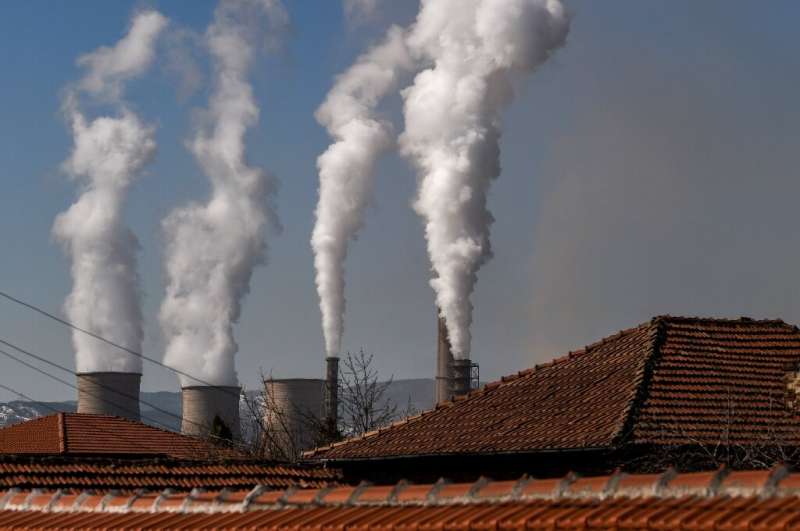Online climate deniers can monetize their content and become minor celebrities, researchers say.
Fossil fuel-funded right-wing ideologues, fame-seeking narcissists and doubt-mongers who monetize their content are fueling climate misinformation that undermines the fight against global warming, researchers say.
Experts interviewed by AFP outlined six key things that motivate people to deny climate change or seek to delay action.
oil money
Studies have documented cash flows from the fossil fuel industry to conservative US think tanks, singled out by researchers as making misleading climate claims.
Greenpeace on the site exxonsecrets.org published documents from the oil giant ExxonMobil that reveal donations it made in the 1990s and 2000s to three such bodies: the Heartland Institute, the Competitive Enterprise Institute and the Cato Institute. Exxon has repeatedly denied working against climate science.
An analysis of tax documents and donor records by Brown University sociologist Robert Brulle found that 91 climate-skeptical think tanks and lobbyists received $900 million in income from 2003-2010, much of it from foundations. conservative.
Since the mid-2000s, funding has largely been channeled through philanthropic groups that hide their donations.
“Fossil fuel companies have a long history of funding climate misinformation promulgated by conservative think tanks,” Brulle told AFP.
“This misinformation has misled many Americans about the risks associated with climate change and has hampered action to mitigate carbon emissions.”

Greenpeace has revealed that the oil company ExxonMobil donated to groups of skeptical experts on the climate.
monetizing
Elsewhere, there are people “who are profiting from the online outrage economy and are exploiting the current business model of social media, which allows them to monetize climate denial and climate misinformation,” said Jennie King, director of action from the Institute for Strategic Dialogue (ISD), a London-based digital research group.
“There is a huge scam element in the online space. By cultivating a brand as these anti-dark web masterminds, they gain increasing prominence on social media platforms,” he said.
“That drives traffic to their websites and increases the likelihood that they’ll develop brand relationships, sponsorships and paid speaking appearances.”
Ideology
For psychologists, climate misinformation is driven by free-market ideals that make people reject climate reforms.
“The main factor that determines whether people accept or reject climate science is their personal ideology,” said Stephan Lewandowsky, a professor of psychology at the University of Bristol who researches attitudes towards climate change.
“People who are committed to unregulated free markets find it impossible to accept the science because the implications of the science are that we have to have regulations or a price on carbon,” he told AFP.

Some climate policies involve a carbon tax, unpleasant for devotees of the free market.
Politics
Some of the most shared social media posts have come from politicians, such as former US President Donald Trump’s repeated claims on Twitter that the snowfall was evidence against global warming.
“People who vote Conservative are more likely to be in climate denial,” said John Cook, a researcher at Monash University in Melbourne and founder of weather explanatory site Skeptical Science.
“They don’t like solutions to climate change, they reject that there is a problem in the first place.”
A November 2022 study in Nature by researchers at the City, University of London revealed an increase in ideological polarization around climate change during the COP26 climate summit in 2021, “fueled by increasing right-wing activity.”
Psychology
A 2022 paper co-authored by Lewandowsky and Matthew Hornsey of the University of Queensland noted other psychological aspects of climate claims, such as “motivated reasoning”: people decide what they believe and then look for evidence to support their point of view, and “aversion to the solution” against the reforms that imply a painful sacrifice.
“Also, people are afraid of climate change,” Lewandowsky said.
“Launching into denial in the context of fear is not uncommon. The pandemic is another good example.”

Trump has repeatedly suggested that snowfall is evidence against climate change.
Fame
Some climate mavericks have millions of followers on social media.
“I think malignant narcissism is probably a big driver for influencers,” Cook said.
“These kinds of mini-celebrities, what makes them popular, famous, gets a following, gets blog readers, is their denial of science.”
Some prolific opponents are former meteorologists, such as Anthony Watts, founder of the skeptical blog Watts Up With That, or the scientists themselves.
“I can think of individual instances of academics who had an extremely mediocre career at best and then climate change hit and said, ‘Oh, that’s a hoax’ and claimed to have some expertise,” Lewandowsky said.
“They were inundated with requests from the media. These guys are motivated by attention.”
© 2023 AFP
Citation: Politics, Cash, Fame: What Motivates Climate Change Deniers (January 31, 2023) Accessed January 31, 2023 at https://phys.org/news/2023-01-politics-cash-fame -climate-deniers.html
This document is subject to copyright. Apart from any fair dealing for private study or research purposes, no part may be reproduced without written permission. The content is provided for informational purposes only.




